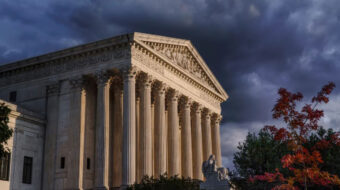News Analysis
According to a U.S. Army study, unprecedented numbers of African American youth are refusing to join the Army and they are doing so for a very clear reason — opposition to the Iraq war.
But you may not see this story on the front page of your local paper. The Pentagon has moved to squelch it. The report had been posted on the Defense Contracting Command web site but has since been removed after news stories came out about it.
The study, based on interviews with more than 3,000 youth 16-24, found that Army recruitment of Blacks has fallen 41 percent since 2000 and has been steadily decreasing.
In 2000, for example, 23.5 percent of Army recruits were African American. By February of this year, that figure dropped to 13.9 percent.
The Defense Department has attributed the sharp decline to the unpopularity of the war in Iraq among African Americans and their general philosophical differences with Bush administration policies.
African Americans “have strong concerns relating to mistrust of the military and recruiters,” bemoaned Lt. Col. John Keeter of the U.S. Army Accessions Command in a December meeting of recruiting researchers, according to the Associated Press.
African American and Hispanic youth are more concerned than whites about ending up in combat “particularly for a cause they don’t support,” he said. For many years African Americans, who are only 12 percent of the nation’s population, comprised a disproportionate share of Army recruits — upwards of 25 percent — more than twice the general population.
Army research found that one of the biggest obstacles to African American youth recruitment is the influence of moral figures such as parents, guidance counselors, members of the clergy, coaches and teachers. The study found that African American and Hispanic parents have less trust in the military than whites.
The AP reported that last September, while the rest of the nation was almost evenly split on the war, 72 percent of Blacks disapproved of the war, according to a Joint Center for Political and Economic Studies survey. And a Gallup Poll one year after the invasion of Iraq reported that while 78 percent of whites supported the war, only 29 percent of Blacks did.
Moreover, Black youth did not believe that important people in their lives would support their decision to join the military. This has broad implications because, according to the military’s own research, Blacks’ attitudes toward the military are significantly influenced by their support systems.
“Whites were less influenced by extended family, teachers and guidance counselors than blacks and-or Hispanics,” the survey found.
Women also generally oppose the war for similar reasons as African American youth and are also joining in fewer numbers. Eighty percent of Blacks and 71 percent of women reported that the war made them less likely to join the military, the study said.
For the first time in five years, the Army missed its recruiting target of 7,050 by 26 percent. ROTC and the National Guard are having similar troubles. The Marine Corps fell slightly short of its recruiting goal in January, the first month that had happened in nearly a decade.
So concerned is the Army that they are conducting intense research and honing advertising strategies to affect the trend. The Army, which employs several major marketing agencies to promote recruitment efforts, has been stepping up activities in Black communities where unemployment is disproportionately high.
The Army claims that another reason for recruitment drop-off among Black youth is a stronger economy and, thus, more jobs. But official Black unemployment was 10.6 percent in the first quarter of 2005 — double the overall 5.3 percent for whites — and a quarter of Black households remain below the federal poverty line, so it is hard to see how this argument applies.
Generous enlistment bonuses to prospective recruits and an increase in the number of recruiters have failed to turn the tide. Some experts say the lagging recruitment raises the specter of the Pentagon turning to the reinstatement of the draft.











Comments